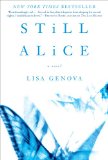Page 2 of 2
There are currently 11 reader reviews for Still Alice
Write your own review!
Ladyslott
Moving and unforgettable
Alice Howland is leading a pretty good life. At fifty years old she is a Professor of Cognitive Psychology at Harvard and is an expert in linguistics. Her husband John is a respected research scientist also at Harvard. They have 3 adult children and a happy marriage. As Alice begins to notice that she is becoming forgetful and losing things more often she chalks it up to menopause, stress, over work and her very busy life. When she gets lost just a few blocks from her home on a route she knows by heart she knows something is wrong. Scheduling an appointment to see a neurologist she is preparing herself for a diagnosis of a brain tumor. What she gets is a diagnosis of Early Onset Alzheimer’s Disease and everything in her life will never be the same.
Lisa Genova has written a powerful and deeply moving book of the descent into Alzheimer’s from the point of view of Alice. By putting a very human face on this disease, we are drawn into the destruction of this illness, not only Alice’s losses, but those of her friends, colleagues and family. I found the writing to be beautiful and felt I really knew Alice and took this journey with her. It has changed the way I think about this disease and its devastating effects.
Anyone who has ever dealt with any overwhelming medical diagnosis can relate to many of the situations portrayed in this story. The most significant message of all is that those who love you and that you have loved are the most important parts of your life, for they will hold their memories of you in their hearts and minds, even if you can’t remember them.
Robin Irwin
A moving read with unrealistic ending
I am familiar with the condition, watching my MiL from early stages till death. While I felt Ms Genova explored many of the dynamics of the disease and the family and their reactions, I felt in ending the book when she did, she wimped out on the full reality of the condition. The sad fact of the eventual disappearance of the person until they are a mute, bedridden shadow of their former self means the reader is not taken on the full journey. While such an ending is sad it could have been alluded to in an epilogue. I found the epilogue in this book was not really an epilogue at all.
janet weaver
STILL ALICE
I thought this book had a lot of good information, and was intriguing in many ways. I particularly thought the daily quiz the protagonist set up to test herself and protect herself from overstaying her intellectual shelf life was terrific. If the author had had the courage to allow her heroine to die with dignity, I would have applauded the book. However, I found the ending jarringly false. Everyone was living happily ever-after, including the older daughter who was breezing through raising infant twins, while knowing she herself was going to suffer her mother's fate, and happily having bed-soiling mother live with her (with the help of one of those marvelous care-givers who seem to exist mostly between the covers of not-very-realistic novels). My mother and my mother in law both died of Alzheimer's, and they were not "still" the women they had been all their lives, even if they occupied the bodies that had once contained them. Had they been able to die with dignity three years before their ignominious deaths, the places they occupy in the memories of those left behind would have been far different.




